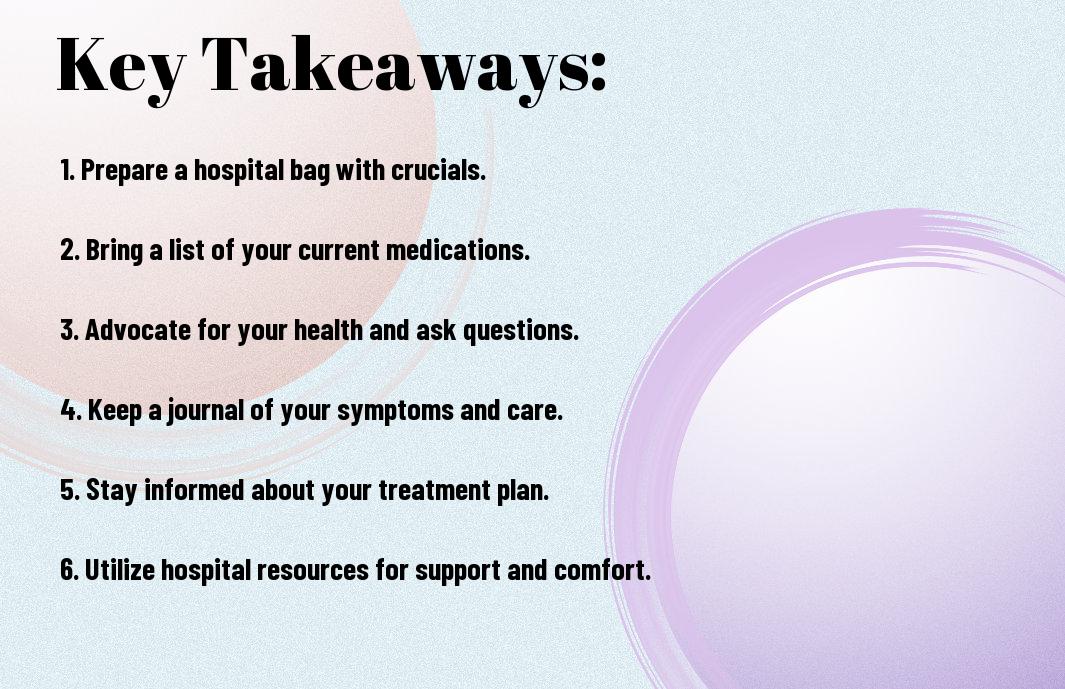Smooth Hospital : It’s crucial to be prepared when facing a hospital stay for yourself or a loved one. Hospital stays can be overwhelming emotionally and physically, but there are steps you can take to ensure a smoother experience. By following these 10 imperative tips, you can navigate the hospital environment with confidence and ease.
Key Takeaways:
- Plan Ahead: Make arrangements for transportation, accommodations, and communication before entering the hospital.
- Bring Essential Items: Pack necessary items such as toiletries, comfortable clothing, and important documents for your stay.
- Communicate Effectively: Clearly convey your medical history, symptoms, and concerns to healthcare providers to ensure proper care.
- Stay Informed: Ask questions about your treatment plan, medications, and potential side effects to stay informed about your care.
- Advocate for Yourself: Don’t hesitate to speak up if you have any worries or questions about your treatment, recovery, or discharge.


Before Admission
Some of the most important aspects of a hospital stay happen before you even step foot in the door. Planning and preparation can make a world of difference in the smoothness of your experience. Here are some important tips to help you navigate the pre-admission process with ease.
Tip 1: Understanding Your Health Condition
The first step in preparing for a hospital stay is to fully understand your health condition. Take the time to educate yourself about your diagnosis, treatment options, and potential outcomes. This will not only help you communicate effectively with your healthcare team but also allow you to be an active participant in your care plan.
The more knowledge you have about your health condition, the better equipped you will be to ask questions, express concerns, and make informed decisions. Don’t hesitate to reach out to your healthcare provider for clarification or seek additional resources such as support groups or online forums for more information.
Tip 2: Pre-Admission Paperwork and Insurance
For a smooth pre-admission process, it’s important to ensure all necessary paperwork and insurance details are in order. Contact the hospital ahead of time to inquire about any required forms or documentation. Make sure to have your insurance information handy and verify coverage for the planned procedure or treatment.
To avoid any billing surprises, it’s crucial to understand your insurance policy’s coverage, including co-pays, deductibles, and any out-of-network expenses. Keep a record of all communication with your insurance company and the hospital to prevent any potential issues down the line.
Packing for the Stay
Preparing for a hospital stay can alleviate stress and make the experience more comfortable. Packing the right importants can help you feel more at ease during your time at the hospital. Here are some tips on what to pack to ensure a smooth hospital stay.
Tip 3: Essentials to Bring to the Hospital
With any hospital stay, it’s important to pack the necessary items to make the experience more comfortable. Be sure to bring your identification, insurance information, and any necessary medical documents or a list of medications. Having these items readily available can streamline the check-in process and ensure that the medical staff has all the information they need to care for you effectively.
Tip 4: Items for Comfort and Entertainment
Any hospital stay can feel long and tedious, so it’s crucial to pack items that can provide comfort and entertainment during your downtime. Consider bringing your own pajamas, slippers, and toiletries to make you feel more at home. Additionally, bringing a book, tablet, or other forms of entertainment can help pass the time and keep your mind occupied.
Plus, having a comfortable pillow and blanket can enhance your rest and relaxation while in the hospital. Personal items that bring you comfort can make a significant difference in your overall well-being during your stay.
Communication with Healthcare Professionals
Effective communication with healthcare professionals is crucial for ensuring a smooth hospital stay. Clear and open communication can help you receive the best care possible and avoid misunderstandings. Here are some imperative tips to enhance your communication with healthcare professionals during your hospital stay.
Tip 5: Advocating for Your Own Health
For advocating for your own health, it is important to openly share your concerns, ask questions, and actively participate in decisions regarding your treatment. Be assertive in expressing your needs and preferences, and don’t hesitate to seek clarification if you don’t fully understand something. Keep in mind, you are your best advocate when it comes to your health.
Tip 6: Keeping Track of Your Medical Information
Keeping track of your medical information is imperative for ensuring that all healthcare professionals involved in your care have access to accurate and up-to-date information. Keep a record of your medications, allergies, past medical history, and any recent test results. This can help prevent medication errors, duplication of tests, and ensure coordinated care throughout your hospital stay.
With advances in technology, there are now convenient ways to keep track of your medical information. Consider using mobile health apps or online patient portals offered by healthcare providers to store and access your medical records easily. This can streamline communication with healthcare professionals and empower you to take an active role in your care.
Navigating the Hospital Environment
Not everyone is familiar with the hospital environment, and being a patient can be overwhelming. Understanding how to navigate the hospital setting can help make your stay smoother and more comfortable.
Tip 7: Understanding Hospital Procedures and Schedules
With the multitude of procedures and schedules in a hospital, it can be confusing to know what to expect. Make sure to ask questions and familiarize yourself with the routines of the hospital. Knowing when meals are served, when doctors do their rounds, and what procedures you are scheduled for can help you feel more in control of your stay.
Tip 8: Privacy and Safety in a Hospital Setting
Understanding the importance of privacy and safety in a hospital setting is crucial for your well-being. Ensure that your personal information is kept confidential and that only authorized individuals have access to your medical records.
It’s also vital to be aware of safety measures in place, such as call buttons and emergency exits. Following hospital protocols and guidelines can help prevent accidents and ensure a secure environment for both patients and staff.
Visitors and Support Network
All hospital stays can be made easier with the presence of a strong support network. From family and friends to hospital staff, having a network of people around can provide comfort and assistance during your time in the hospital.
Tip 9: Coordinating Visits from Family and Friends
Support from loved ones can significantly impact your well-being during a hospital stay. Coordinate visitation schedules with your family and friends to ensure a steady stream of support while also respecting your need for rest and recovery. Communicate your preferences and limitations regarding visitors to avoid any conflicts or disruptions in your care.
It is important to communicate openly and honestly with your loved ones about your needs and expectations during your hospital stay. Let them know how they can best support you, whether it’s by bringing necessities from home, providing emotional support, or helping with communication between you and the medical team.
Also Read : Debunking Common Hospital Myths – Separating Fact From Fiction
Tip 10: Utilizing Hospital Resources and Support Services
Visits from family and friends are vital, but it’s also crucial to take advantage of the resources and support services offered by the hospital. These services can include social workers, counselors, support groups, and more, all aimed at helping patients cope with the challenges of hospitalization. Don’t hesitate to ask your healthcare team about the available resources that can enhance your overall well-being.
Adhering to a treatment plan and staying informed about your condition can be made easier with the assistance of these support services. Take advantage of any educational materials, financial assistance programs, or mental health services that can help you navigate your hospital stay more effectively.
Post-Discharge Planning
Despite the relief of leaving the hospital, the journey to full recovery continues even after you are discharged. Post-discharge planning is crucial to ensure a smooth transition back to your daily life and optimal health. Here are some necessary tips to help you navigate this phase successfully.
Preparing for Recovery at Home
An important aspect of post-discharge planning is preparing for recovery at home. Make sure your living environment is safe and conducive to your healing process. Ensure that you have necessary medications, medical supplies, and equipment easily accessible. Arrange for help with daily tasks if needed, and have a plan in place for emergencies.
Set realistic expectations for your recovery and establish a routine that includes proper rest, nutrition, and exercise. Follow your healthcare provider’s instructions regarding wound care, medication management, and symptom monitoring. Reach out to your support system for emotional and physical assistance during this crucial time.
Also read :
Scheduling Follow-up Appointments and Rehabilitation
On discharge, it is necessary to schedule follow-up appointments with your healthcare providers to monitor your progress and address any concerns. Rehabilitation, if recommended, plays a vital role in restoring your strength and function. This may include physical therapy, occupational therapy, or cardiac rehabilitation depending on your condition.
The success of your recovery often hinges on adherence to scheduled appointments and rehabilitation sessions. Commit to following through with the recommended treatment plan to optimize your outcomes. Stay proactive in communicating any challenges or improvements with your healthcare team to ensure personalized care.
Summing up
Presently, hospitals can be overwhelming and stressful environments. However, by following these 10 vital tips for a smooth hospital stay, patients can ensure a more comfortable and efficient experience during their time in a healthcare facility. From communicating with healthcare providers to staying organized with important documents, these tips are designed to help patients navigate their hospital stay with confidence and ease.
FAQ
Q: Why is it important to prepare for a hospital stay?
A: It is important to prepare for a hospital stay to ensure a smooth and comfortable experience, as well as to support your recovery process.
Q: How can I pack for a hospital stay?
A: When packing for a hospital stay, include crucial items such as comfortable clothing, personal toiletries, medications, important documents, and any items that bring you comfort.
Q: What should I know about my medical history before going to the hospital?
A: Before going to the hospital, it is important to know details of your medical history, including any chronic conditions, allergies, current medications, and previous surgeries or treatments.
Q: How can I communicate effectively with hospital staff during my stay?
A: To communicate effectively with hospital staff, be open and honest about your symptoms, concerns, and needs. Ask questions, repeat information to ensure understanding, and keep a list of important contacts handy.
Q: How can I manage pain and discomfort during a hospital stay?
A: To manage pain and discomfort during a hospital stay, work with your healthcare team to develop a pain management plan, use relaxation techniques, request pain medication when needed, and communicate any changes in your pain levels.
Q: What steps can I take to prevent infections during my hospital stay?
A: To prevent infections during your hospital stay, practice good hand hygiene, follow all infection control procedures, keep your room clean, and speak up if you have concerns about cleanliness or infection risks.
Q: How can I ensure a smooth transition after my hospital stay?
A: To ensure a smooth transition after your hospital stay, work with your healthcare team to understand your discharge plan, follow all post-discharge instructions, schedule follow-up appointments, and have a support system in place for assistance if needed.